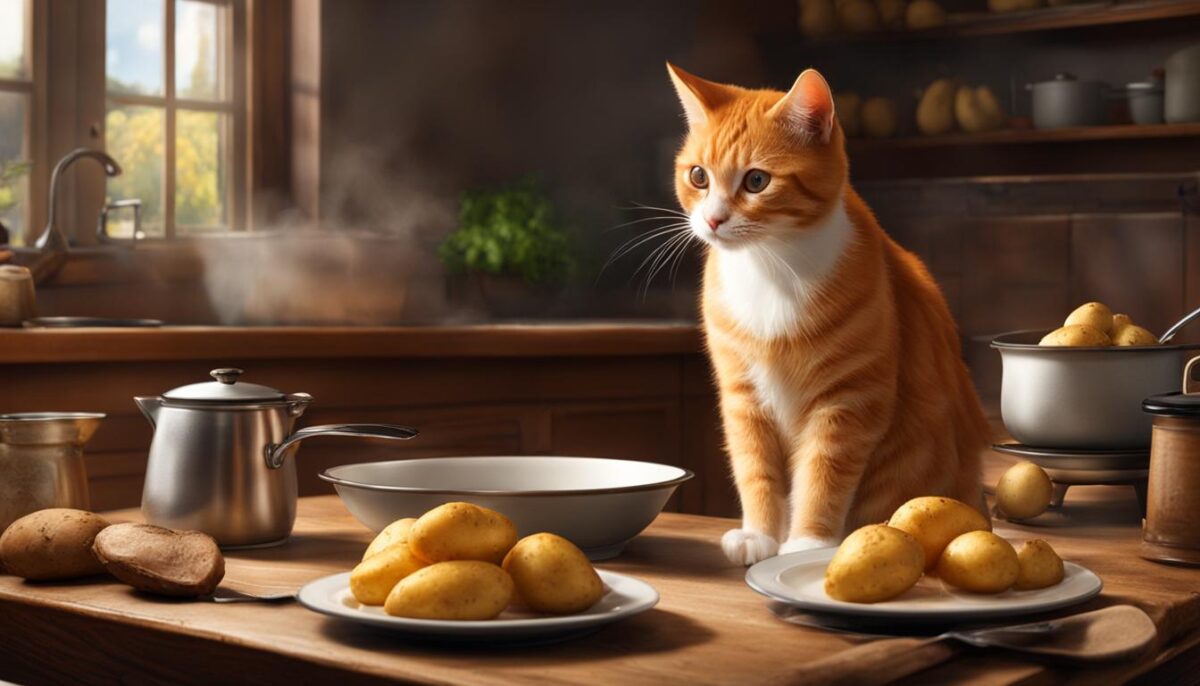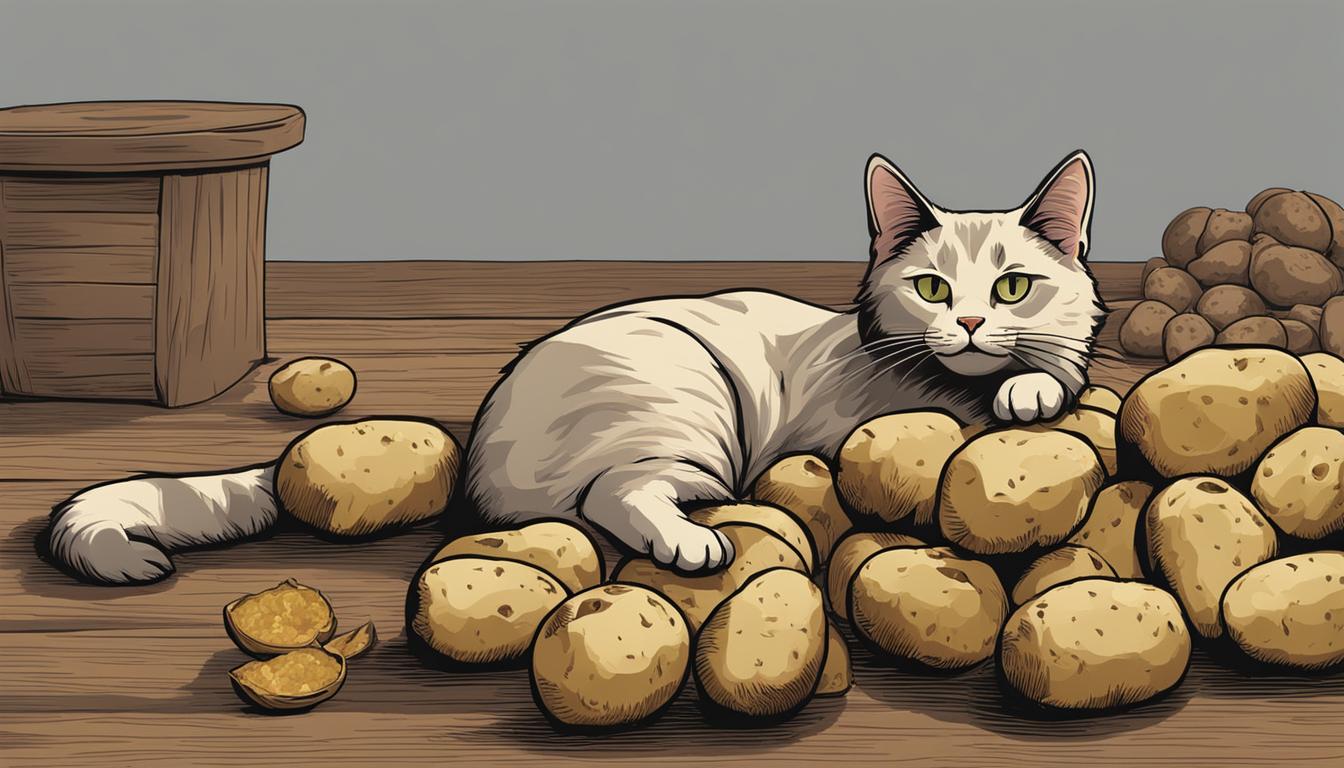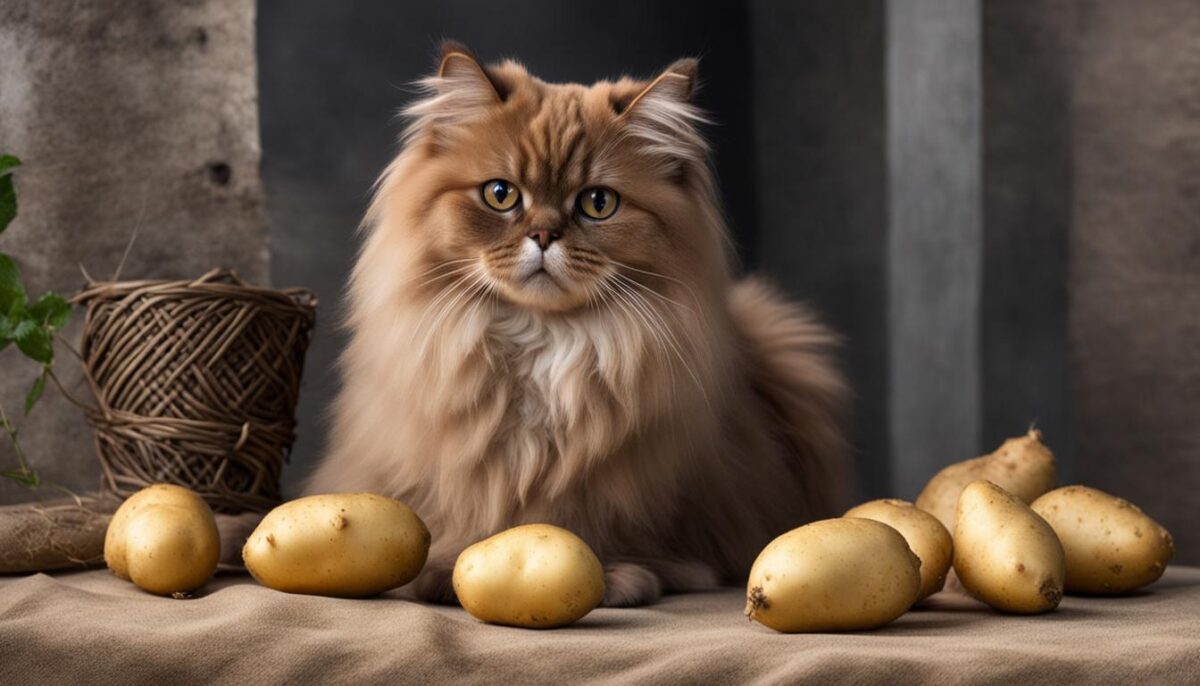Cats have unique dietary requirements, and their digestive systems can be sensitive to certain foods. In this article, we will explore the topic of feeding potatoes to Persian cats and provide you with valuable insights to ensure the well-being of your feline companion.
Persian cats are obligate carnivores, which means their bodies are adapted to thrive on a diet primarily consisting of animal-based proteins. While carbohydrates are not essential for cats, they can be a source of energy in small amounts. Potatoes, being a starchy vegetable, contain various nutrients beneficial to humans. However, cats have different nutritional needs and cannot derive the same benefits from potatoes as humans do.
Feeding potatoes to Persian cats can pose several risks, as raw potatoes contain solanine, a naturally occurring toxic compound. Cooked potatoes, especially when fried or seasoned, can also be problematic for cats. It is recommended to consider potatoes as an occasional indulgence rather than a regular component of their diet.
Key Takeaways:
- Feeding potatoes to Persian cats can be risky due to their unique dietary requirements.
- Raw potatoes contain solanine, a toxic compound for cats.
- Cooked potatoes, especially when fried or seasoned, can also be problematic for cats.
- Persian cats are obligate carnivores and derive energy primarily from animal-based proteins.
- Consider potatoes as an occasional indulgence rather than a regular component of their diet.
Understanding the Dietary Needs of Persian Cats
Persian cats have unique dietary needs that are important to consider for their overall health and well-being. As obligate carnivores, their bodies are adapted to thrive on a diet primarily consisting of animal-based proteins. While carbohydrates are not essential for cats, they can provide a source of energy in small amounts.
When it comes to meeting the nutritional requirements of Persian cats, it’s crucial to focus on high-quality cat food that is specifically formulated to meet their needs. This ensures that they receive the necessary nutrients and support their optimal health.
Incorporating a balanced diet that prioritizes animal-based proteins and minimizes carbohydrates is key for Persian cats. This helps to mimic their natural diet and ensures that they receive the necessary nutrients for a healthy and happy life.
| Nutritional Needs of Persian Cats | Recommended Diet |
|---|---|
| Animal-based proteins | High-quality cat food formulated for Persian cats |
| Essential amino acids | Meat-based protein sources such as chicken, fish, or turkey |
| Healthy fats | Omega-3 fatty acids from fish oil or flaxseed oil |
| Vitamins and minerals | Fruits and vegetables in small amounts as occasional treats |
It’s important to note that while Persian cats may have unique dietary needs, individual cats may have specific requirements or sensitivities. Consulting with a veterinarian is always recommended to ensure that you are providing the most suitable diet for your Persian cat.
The Nutritional Value of Potatoes
Potatoes are starchy vegetables that offer various nutritional benefits to humans. They are rich in essential nutrients such as vitamin C, potassium, and dietary fiber. Vitamin C is an antioxidant that helps boost the immune system and promotes healthy skin. Potassium is important for maintaining proper heart function and controlling blood pressure. Dietary fiber aids in digestion, promotes satiety, and supports a healthy gut.
However, it’s important to note that cats have different nutritional needs and cannot derive the same benefits from potatoes as humans do. While potatoes contain some nutrients that are beneficial to cats, such as vitamin C, the quantities present may not be sufficient to meet their dietary requirements. Cats are obligate carnivores, meaning their bodies are designed to thrive on a diet primarily consisting of animal-based proteins.
Additionally, cats lack certain enzymes needed to break down and digest certain components found in potatoes. This can lead to digestive issues, such as upset stomach or diarrhea, if potatoes are consumed in large quantities. Therefore, it is best to avoid feeding potatoes to cats and instead focus on providing them with a balanced diet that meets their specific nutritional needs.
The Nutritional Components of Potatoes
| Nutrient | Amount per 100g |
|---|---|
| Energy | 77 calories |
| Carbohydrates | 17 grams |
| Protein | 2 grams |
| Fat | 0.1 grams |
| Dietary Fiber | 2.2 grams |
| Potassium | 429 milligrams |
| Vitamin C | 19.7 milligrams |
Table: Nutritional components of potatoes per 100g.
In conclusion, while potatoes are nutritious for humans, they do not provide the same benefits to cats. It is important to prioritize a balanced diet that focuses on the specific nutritional needs of cats, which primarily consist of animal-based proteins. If you have any concerns about your cat’s diet or nutrition, consult with your veterinarian for personalized advice.
Potential Risks of Feeding Potatoes to Persian Cats
Feeding potatoes to Persian cats can pose several risks that can affect their health. One of the primary concerns is the presence of solanine, a naturally occurring toxic compound found in raw potatoes. If ingested in large quantities, solanine can be harmful to cats and may lead to various health issues. It is important to note that solanine is not destroyed by cooking, so even cooked potatoes can still contain this toxic compound.
In addition to solanine, cooked potatoes, especially when fried or seasoned with additives like salt or garlic, can also be problematic for cats. These additional ingredients can further upset their delicate digestive system and potentially lead to gastrointestinal issues such as an upset stomach, diarrhea, or even pancreatitis.
Therefore, it is crucial to avoid feeding potatoes to Persian cats, whether raw or cooked. Instead, focus on providing them with a balanced diet that meets their specific nutritional needs and consists of high-quality cat food formulated to support their overall health and well-being.
Symptoms to Watch Out For
If you suspect that your Persian cat has consumed potatoes or is experiencing any negative reactions, it’s important to be aware of the following symptoms:
- Excessive vomiting or diarrhea
- Lethargy or lack of appetite
- Abdominal pain or discomfort
- Difficulty breathing or increased respiratory rate
If you notice any of these symptoms or have concerns about your cat’s health, consult with your veterinarian immediately. They will be able to provide proper guidance and support to ensure your cat’s well-being.
Safe Alternatives for Carbohydrate Sources
If you want to provide your Persian cat with some carbohydrates in their diet, there are safe alternatives to potatoes that you can consider. These alternatives offer nutritional benefits while minimizing the potential risks associated with regular potatoes.
One safe alternative is cooked and mashed sweet potatoes. Sweet potatoes are a nutritious source of carbohydrates that can be easily prepared for your cat. Simply cook the sweet potatoes until they are soft, mash them, and serve them to your Persian cat in small amounts. Sweet potatoes contain fiber, vitamins, and minerals that can be beneficial for your cat’s overall health.
Another option is pumpkin, which is rich in fiber and low in calories. You can feed your cat cooked and pureed pumpkin as a carbohydrate source. Pumpkin is easy to digest and can help with digestive issues such as diarrhea or constipation. It also provides vitamins and minerals that can support your Persian cat’s immune system.
Remember, when introducing any new food to your cat’s diet, including alternatives to potatoes, it’s important to do so gradually and in moderation. Observe your cat for any negative reactions or digestive issues. If you notice any allergic reactions or digestive problems, discontinue the new food and consult your veterinarian for further guidance.
Moderation is Key
When it comes to feeding food that is not part of a cat’s natural diet, moderation is key. While Persian cats may show interest in potatoes, it’s important to limit their consumption and consider them as an occasional indulgence rather than a regular component of their diet. The focus should always be on providing a balanced and nutritionally complete diet for your feline friend.
Persian cats have unique dietary needs, and their bodies are adapted to thrive on a diet primarily consisting of animal-based proteins. High-quality cat food formulated specifically for their needs should be their main source of nutrition. This ensures they receive all the essential nutrients they require for optimal health.
While carbohydrates are not essential for cats, they can be included in their diet in small amounts. However, it is important to choose safe alternatives that offer nutritional benefits without the potential risks associated with regular potatoes. Cooked and mashed sweet potatoes or pumpkin can be considered as safer carbohydrate sources for Persian cats.

Signs of Allergic Reactions or Digestive Issues
If you decide to introduce potatoes or alternative carbohydrate sources into your Persian cat’s diet, it is important to carefully observe them for any signs of allergic reactions or digestive issues. Each cat is unique, and their tolerance to different foods can vary. Being attentive to their behavior and any changes in their health can help you ensure their well-being.
Some common signs of allergic reactions in cats include excessive itching, skin rashes, or gastrointestinal distress. If you notice your Persian cat excessively scratching or developing skin irritations after consuming potatoes, it might indicate an allergic reaction. Similarly, if your cat experiences digestive issues such as upset stomach or diarrhea after eating potatoes, it could be a sign of intolerance or sensitivity to the food.
If you observe any negative responses or notice ongoing discomfort in your Persian cat, it is crucial to stop feeding potatoes immediately. Continuing to feed them potatoes can worsen their symptoms and potentially lead to more serious health problems. It is advisable to consult with a veterinarian who can provide guidance on managing allergic reactions or addressing digestive issues in your cat.
Remember, ensuring the well-being of your Persian cat is of utmost importance, and paying attention to their dietary choices and responses is an essential part of responsible pet ownership.
Conclusion
In conclusion, when it comes to feeding Persian cats, it’s important to make the right dietary choices. While potatoes may be a common food item for humans, they are not suitable for our feline friends. Persian cats have unique nutritional needs that are best met through a balanced diet.
Instead of incorporating potatoes into their meals, focus on providing high-quality cat food that is specifically formulated to meet their nutritional needs. This will ensure their overall health and well-being.
Remember, a balanced diet is key. Pay attention to the ingredients in your cat’s food and consult with your veterinarian to ensure you are meeting their specific dietary requirements. By making informed choices, you can give your Persian cat the nutrition they need to thrive.
FAQ
Can cats eat potatoes?
Cats can technically eat potatoes, but it is not recommended. Potatoes are not a natural part of a cat’s diet and can pose several risks to their health.
Are potatoes safe for cats?
Feeding potatoes to cats can be problematic. Raw potatoes contain solanine, a toxic compound, and cooked potatoes, especially when fried or seasoned, can also be problematic for cats.
What are the risks of feeding potatoes to Persian cats?
Feeding potatoes to Persian cats can lead to gastrointestinal issues such as upset stomach, diarrhea, or even pancreatitis. Raw potatoes contain solanine, which can be harmful if ingested in large quantities.
Can cats eat cooked potatoes?
Cooked potatoes can still pose risks to cats, especially if they are fried or seasoned with additives like salt or garlic. It is best to avoid feeding cooked potatoes to cats.
What are safe alternatives for carbohydrate sources?
If you want to include carbohydrates in your cat’s diet, consider small amounts of cooked and mashed sweet potatoes or pumpkin. These alternatives offer some nutritional benefits while minimizing risks.
How much potatoes should I feed my cat?
It is recommended to consider potatoes as an occasional indulgence rather than a regular component of your cat’s diet. Always prioritize their main source of nutrition, which should consist of high-quality cat food.
How can I observe my cat for allergic reactions or digestive issues?
When introducing any new food to your cat, including potatoes or alternatives, observe them closely. Look for signs of allergic reactions, such as excessive itching, skin rashes, or gastrointestinal distress. If you observe any negative responses, stop feeding potatoes and consult your veterinarian.
What should I focus on when it comes to my Persian cat’s diet?
It is important to provide a balanced diet that primarily consists of high-quality cat food formulated to meet their specific nutritional needs. Consult with your veterinarian regarding your cat’s dietary choices to ensure their well-being.

